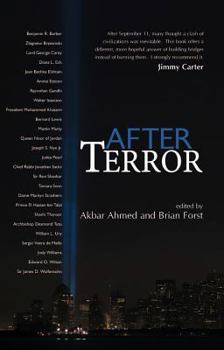After Terror: Promoting Dialogue Among Civilizations
Select Format
Select Condition 
Book Overview
After Terror presents sustained reflections by some of the world's most celebrated thinkers on the most pressing question of our time: how can we find ways to defuse the ticking bombs of terrorism and... This description may be from another edition of this product.
Format:Paperback
Language:English
ISBN:0745635024
ISBN13:9780745635026
Release Date:March 2005
Publisher:Polity Press
Length:160 Pages
Weight:0.65 lbs.
Dimensions:0.6" x 5.5" x 8.5"
Customer Reviews
1 rating
Reflections on a challenging subject
Published by Thriftbooks.com User , 19 years ago
Not even a week after the deadly London Transport bombings, it seems odd to be reviewing a book called After Terror; in today's world, terror never seems to end. But this book of 28 specially-commissioned essays by some of the world's greatest thinkers, activists, and writers, edited by American University professors Akbar Ahmed and Brian Forst, should be required reading for anyone who believes that terrorism can be defeated by the forces of tolerance, respect, and goodwill. If you are one of them, read on. The theme of this book as outlined in an essay by its editors - Akbar Ahmed being one of the world's foremost Islamic scholars and Brian Forst Professor of Justice, Law, and Society at American University - is that there is an alternative to the "clash of civilizations" that Samuel P. Huntington described in his book of the same name. "The creation of enemies is essential to cultural identity," said Huntington, but the authors of these essays are unanimously aligned on their opposition to this theory. This premise can be further broken down into three major themes: that the underlying causes of conflict in the world are due to intolerance; that there is a vital and urgent need to expand the dialogue between civilizations, in order to defuse tensions and avert a Huntingtonian clash; and that there is a dire need to identify poor governance and to improve it in order to deal with the very real threat of terror and its many manifestations in today's world. The essays are divided into four sections: first, the introduction by Ahmed and Forst; next, five essays on "The Nature and Sources of the Problem"; a section on "Pathways to Dialogue and Understanding"; and finally, "From Concern to Action". Examining the authors of the essays is like reading a roll-call of the world's most eminent thinkers, intellectuals, and leaders: Archbishop Desmond Tutu and Prince El Hassan bin Talal, Bernard Lewis and Joseph Nye, Jr., Zbigniew Brzezenski and Chief Rabbi Jonathan Sacks are among the contributors. But do the essays present anything new or meaningful to the reader, or are they merely re-hashings of what has been said over and over again since September 11, 2001? It's a question that isn't easily answered at first. Going back to the major themes of the book, one might find these themes rather self-evident, but the authors of these essays are at pains to explain the nuances and subtleties, as well as to illustrate how their own experiences and reflections have helped them to shape their beliefs. For example, the late Sergio Vieira de Mello (who was killed last year in Iraq), in his essay on "Civilization, Human Rights, and Collective Responsibility", writes movingly about his experiences as the UN Commissioner for Human Rights and describes having seen "the best and worst of what we have to offer to each other"; his work informs his definitions of civilization, globalization, citizenship, and human rights, which he presents with much wisdom and in





